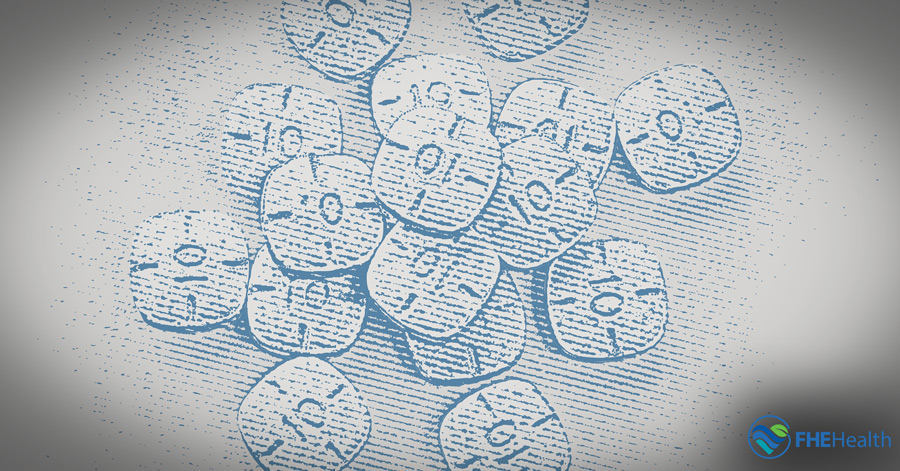
Adderall is a drug made up of two central nervous stimulants, amphetamine and dextroamphetamine. People take this drug to improve their focus, reduce impulsivity and control behavior problems. Today, Adderall is one of the most commonly used prescription drugs in the United States. Still, that doesn’t mean it doesn’t come with risks. Learn more about Adderall, overstimulation and ADHD, and the drug’s addictive properties.
How Does Adderall Work: Adderall, Overstimulation and ADHD
Adderall rebalances the dopamine, serotonin and norepinephrine levels in the brain to drive focus and motivation. Essentially, by increasing the levels of dopamine (the brain’s reward system), the person experiences increased motivation to achieve their tasks and goals.
Adderall is most often prescribed to individuals with attention deficit hyperactivity disorder (ADHD). People with ADHD often find themselves overstimulated, making it difficult to concentrate and complete tasks. Someone with ADHD might find school, work, and everyday upkeep challenging. In this case, Adderall fixes overstimulation so the person’s brain can be brought to a normal level of stimulation and focusing becomes easier. Simply put, it slows down the brain so the person can concentrate.
What Does It Mean to Be Addicted to Adderall?
Unfortunately, many people use Adderall even though they don’t have a medical need for it. One study estimates that approximately 2% of the American population abuses prescription stimulants such as Adderall. The rate of misuse is highest among 18-to-25-year-olds, who are sourcing the drug from friends and family members.
Why Is Adderall Abused?
So, why do people get addicted to Adderall? Individuals choose to abuse Adderall so they can focus on school or work. Additionally, Adderall is sometimes abused as it’s a stimulant and can cause a “high” when consumed in larger-than-recommended quantities. Lastly, Adderall can suppress hunger, so some people take it to lose weight.
It’s important to note that individuals who take Adderall for an existing condition (such as ADHD) and stick to the prescribed amounts are at low risk of developing an addiction. Typically, addiction occurs when an individual:
- Is taking Adderall without a medical need
- Is taking Adderall in greater quantities or more frequently than prescribed
People who abuse Adderall find that they feel stronger, more confident and have more energy. It can then be very tempting to want to feel these things all the time, so the individual continues to take more and more of the drug.
Symptoms of Adderall Addiction
It’s important to recognize the warning signs of an Adderall addiction in yourself or others. The physical symptoms of Adderall abuse are:
- Fast thoughts
- A sense of invincibility
- Nausea and vomiting
- Diarrhea
- Dry mouth
- Anxiety
- Difficulties sleeping
- Weight loss and lack of appetite
- Change in libido
- Shortness of breath
- Heart palpitations
The behavioral warning signs of Adderall misuse are:
- Crushing and snorting Adderall
- Always looking for a new doctor so you can score a new prescription
- Being scared of running out of Adderall
- Obsessing about finding and using Adderall
- Continuously taking a higher dosage of Adderall to get the same high
- Continuing to use Adderall despite negative side effects (such as physical, social, psychological and financial issues)
- Avoiding responsibilities and relationships to prioritize using Adderall
- Experiencing withdrawal symptoms when skipping or reducing Adderall doses
Risk Factors for Adderall Addiction
The overuse of Adderall is unsafe and comes with some significant risks. Some of the potential long-term side effects of abusing Adderall are:
- Increased anxiety
- Withdrawal symptoms
- Addiction
- Insomnia
- Panic attacks
- Cardiovascular issues
- Seizures
- Weight loss and malnutrition
- Toxic psychosis
Adderall Withdrawal Symptoms
When someone is weaning themselves off frequent Adderall use, they’ll likely experience withdrawal symptoms. The severity of the symptoms will depend on how long and how frequently the person has used Adderall.
Withdrawal symptoms for Adderall addiction may include:
- Depression, irritability and mood swings
- Fatigue and difficulties sleeping
- Weight gain
- Stomach aches, nausea and vomiting
- Vomiting
These symptoms usually last between a few days and several weeks.
Treatment Options for Adderall Addiction
Adderall addiction shouldn’t be ignored. If left unaddressed, the addiction can spiral and lead to significant health issues. Additionally, individuals might find they have problems at work, at school or in their close relationships as they spiral into a full-blown addiction.
Luckily, there are treatment options. Rehabilitation programs can offer a combination of therapy and medication to guide a patient through detox and rehab. These programs help people identify why their addiction started, understand their triggers and learn coping mechanisms to avoid relapse after rehab.
Prevention Strategies for Adderall Addiction
Adderall is a useful medication for those who genuinely have ADHD. However, it’s still important to understand the risk of addiction. Here are some tips to prevent Adderall addiction for those who need to take this prescription drug:
- Always acquire your Adderall from a licensed medical doctor.
- Never take more than the amount prescribed by your doctor. If you feel you need more, you can talk to your doctor, who may safely increase your dosage.
- Watch out for warning signs of addiction. If you’re constantly craving more Adderall, it might be time to wean off the medication.
- Ask yourself what the long-term plan is. Adderall isn’t meant to be a lifelong solution. Are there alternative nonprescription options you can pursue to help with your focus and concentration?
Ask for Help Today
There’s no shame in seeking professional help. In fact, it takes courage to admit you have a problem. Remember that you’re not alone if you have an Adderall addiction. This is a highly addictive drug, and many people fall into its trap.
As soon as you suspect you might have a problem, seek help. It’s not worth the risk to your physical and mental health to battle addiction on your own.






